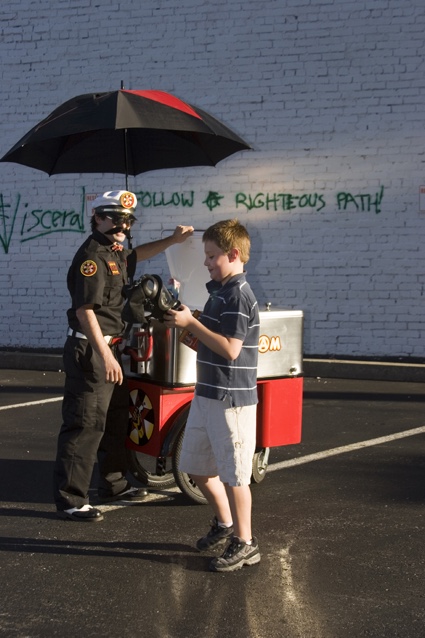 Center for Tactical Magic, The Tactical Ice Cream Unit, 2005
Center for Tactical Magic, The Tactical Ice Cream Unit, 2005
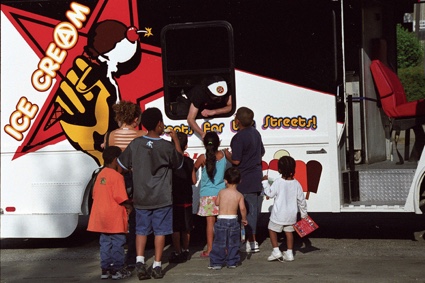 Center for Tactical Magic, The Tactical Ice Cream Unit, 2005
Center for Tactical Magic, The Tactical Ice Cream Unit, 2005
I’ve been dreaming of interviewing The Center for Tactical Magic ever since i read about the existence of this activist art collective in one of my favourite art catalogues ever: The Interventionists. Users’ Manual for the Creative Disruption of Everyday Life.
Lucky me, last week, i finally got to talk over Skype with Aaron Gach, the founder of the Center for Tactical Magic and a professor at the California College of the Arts. Gach is an artist with the most unusual background. As part of his artistic training, he decided to study with 3 people who have their own understanding of power: a magician, a ninja, and a private investigator and there is a bit of the strategies deployed by each of these figures in the work of the CTM. The work of the group is further enriched by the expertise brought about by the individuals and communities CTM collaborates with: hypnotists, biologists, engineers, nurses, military intelligence officers, radical ecologists, former bank robbers, security experts, etc.
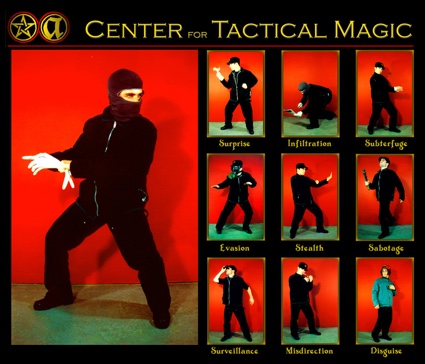 Center for Tactical Magic, The Ultimate Jacket
Center for Tactical Magic, The Ultimate Jacket
Center for Tactical Magic, Witches’ Cradles, Toronto, Canada
The Center for Tactical Magic uses any craft and scheme available, from the most magical to the most pragmatic, to address issues of power relations and self-empowerment. At the CTM we are committed to achieving the Great Work of Tactical Magic through community-based projects, daily interdiction, and the activation of latent energies toward positive social transformation.
CTM’s work combines appealing aesthetics, humour and language with actions that invite people to think, question and reclaim their civil rights. Their most famous project is the Tactical Ice Cream Unit, a truck distributing free ice cream along with propaganda developed by local progressive groups. Another of their initiative saw them launch a bank heist contest. And a year before that, they responded to New York’s stop-and-frisk policy by screening Linking & Unlinking on a digital billboard in Manhattan. The billboard showed amateur footage demonstrating how to pick a pair of handcuffs, magicians performing a classic magic trick called “linking rings“, while a text from the American Civil Liberties Union was scrolling down and explaining passersby what their rights were if they were stopped by the police. In 2013, they set up big Witches’ Cradles that evoke the Inquisition and enveloped people into an altered state (of consciousness, or an altered political state). Most recently, Gach directed and performed a radical magic show which drew parallels between magic acts and contemporary issues such as economic manipulation, political deception, vanishing resources, and social transformation.
Hi Aaron! The Tactical Ice Cream Unit is probably one of my favorite works ever. I first heard about it almost 10 years ago. The vehicle combines ‘a number of successful activist strategies (Food-Not-Bombs, Copwatch, Indymedia, infoshops, etc) into one mega-mobile”, and comes with high-tech surveillance devices. Are you still using it?
Yes, still using it! Not as much as when it was launched but it does still make it out occasionally. So it’s definitely not an everyday operation, it’s kind of a labour of love.
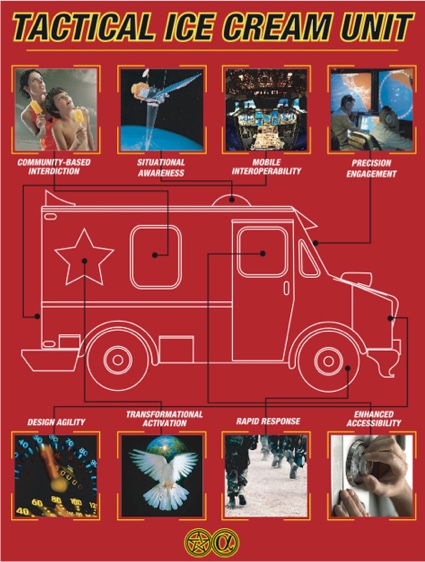 Center for Tactical Magic, The Tactical Ice Cream Unit, 2005
Center for Tactical Magic, The Tactical Ice Cream Unit, 2005
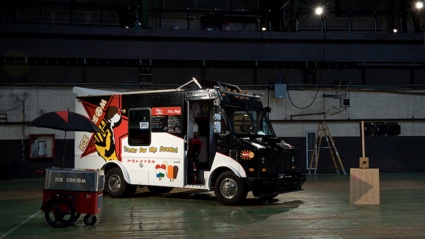 Center for Tactical Magic, The Tactical Ice Cream Unit, 2005
Center for Tactical Magic, The Tactical Ice Cream Unit, 2005
When do you use it? When there’s something happening and you feel it would be right to intervene? Or more when you’re invited by a museum or festival for example?
All of the above. Sometimes it’s an invitation to do something with it. Sometimes there’s an event happening or an issue where it seems like it would make sense to bring it out.
Recently, and for the first time, there was a protest event where i actually felt like it was inappropriate to bring it out. We’ve been having a lot of racial tensions in the U.S. and there were a number of protests in Oakland around police brutality. We’ve done police accountability protests with the Tactical Ice Cream Unit in the past. The TICU always brings with it a sort of levity or lightheartedness or a little bit of the carnival along with the serious critique. But because of how grave and serious these racial issues are, there was a sense that bringing the ice cream unit out to those protests could potentially give the wrong impression.
Have you found that you had to update or modify in any way your tools and strategies over the 10 years you’ve had the van?
Of course a lot has changed since we’ve launched it. At the end of 2004, there were not many mobile food trucks, it was not really a phenomenon at the time. The TICU turned heads a lot more than it does now in terms of its general appearance. But at the same time it also functions now as some kind of camouflage that didn’t exist then. So in terms of masking ourselves, in some ways it got easier since it makes less of a visual impact.
As for the technology, when we first launched it we were using a mobile wifi transmitter and making it a mobile wifi hotspot. At the time, it wasn’t that common at all. It was also expensive to do and it worked most of the time but the speeds for access were really slow. Most people now have access to the internet on their smartphone. The surveillance on the vehicle is still functional and the amount that we can record has increased. In the beginning, our whole hard drive system was something like 200 gigabytes and that has certainly grown. Even then, the way that we had the system up made it possible to record quite a lot. We had to do a tremendous amount of research to set up the power system. The vehicle was running on a gasoline combustion engine. We also had a generator, a battery bank that was being charged by solar panels and at the same time we were running something called phantom power which is a way of silently powering the electronics. This was essential because we wanted to make sure that the surveillance could be running even when the vehicle was turned off. This was more done as a theoretical design process, we wanted to see whether we could accomplish that goal. And there had been rumours floating around the internet of primarily military technologies that were able to do this and sure enough we were able to work with an engineer and designer whose main clients were the military and oil companies. Oil companies would run phantom power at remote sites where they didn’t have power lines but they wanted to monitor oil fields. So we designed a system able to do that too for the vehicle. What is interesting is that, when we were in Indiana, the police illegally searched the TIU without our knowledge and they were caught on camera doing that. They didn’t know it because the vehicle was turned off and there was no indication that there was power running.
 Center for Tactical Magic, The Tactical Ice Cream Unit, 2005
Center for Tactical Magic, The Tactical Ice Cream Unit, 2005
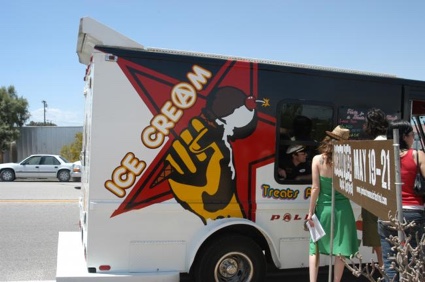 Center for Tactical Magic, The Tactical Ice Cream Unit, 2005
Center for Tactical Magic, The Tactical Ice Cream Unit, 2005
Did you do something about it?
At the time we contacted lawyers and asked what we could do about it but they informed us that there wasn’t much that we could do. We thought about publicizing the video footage. But at the time the TICU wasn’t heavily used and we thought that making that footage available would potentially prevent that capability being used in the future. We didn’t do much with it, it’s in the archive. Maybe at some point, we’ll break it out.
The ice cream truck driver hands out ‘food for thoughts’ leaflets along with the ice creams. What kind of ‘propaganda flavors’ can customers chose from? What’s the content of the leaflets? Is it always the same or does it adapt to the events?
It changes all the time. At this point, we’ve distributed 200 to 250 different pieces of information. Some of it we select or curate. And some of it is selected by the organizations that contact us and send us material to distribute. The idea with leaflets was, on the one hand, to look at models of distribution that exist in community activism, models of distribution where people come together and act on campaigns that they might otherwise not hear or read about. On the other hand, we were looking at the structure of distribution. People are often reluctant to take a leaflet from an activist who is standing in front of them but there are different ways to get people to accept the information. For example, if you go to a restaurant, and you get handed a menu, you don’t resent the waiter for asking you to make a selection. You tend not to select in the menu an item that you are put off by. You look at the options and decide on something that is appealing to you. So we were thinking of the menu as a structure for distribution as well. Our ‘propaganda’ menu exists side by side with different flavours of ice cream and people can pick and choose. There is no direct correlation between a chocolate ice cream and anarchism, for example. People can mix and match what flavours they want. The actual topics of information found on the leaflets go from alternative energy to guerrilla gardening to social justice, to gender justice, to war, war on poverty, class issues, feminism, post-feminism, etc. We also have a few historical items such as the Black Panthers Ten Point Plan. And we have information that is specifically created for children about Greenpeace, the Electronic Frontier Foundation, civil liberties, surveillance, etc. It’s a huge range of information.
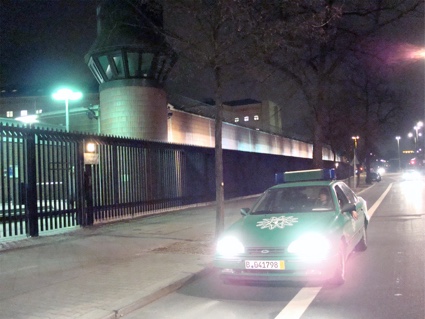 Center for Tactical Magic, Ghost Machine
Center for Tactical Magic, Ghost Machine
Of course, i have to ask you about magic. I always dismissed the magic dimension of your work simply because i don’t take magic seriously at all. But i realize that you do take magic seriously. Reading your interviews, i found that you are not only well versed in magic but you are also very specific about it. You said in an interview with the Center for Artistic Activism: “I’m definitely situated within the spectrum of stage magic and theatrical performance on one end, and occult and metaphysics, kind of ritual magic, supernatural phenomena on the other end.” That surprised me because words like ‘occult’, ‘ritual’ and ‘supernatural’ are a bit dark, aren’t they? How does occultism for example apply to your artistic practice? And can i engage with your work while keeping on ignoring any reference to magic?
I hope so. I think one of the strategies and challenges when building this kind of work is to always incorporate multiple points of access. Within the work, there has to be different moments that appeal to different people. We’re trying to develop projects that are multilayered so magic itself itself exists at multiple levels. What i mean by that is that everyone understands that word ‘magic’ but they imagine completely different things when they hear the word ‘magic.’ We use the same language and assume an understanding but this understanding is vastly different on a subjective level and you can even add on a collective subjective level. When we use the term ‘magic’ both in the name and the realization of a project, there is a realization that there is going to be an explosion of meanings and at the same time a sort of dismissal. This dismissal is historically a way in which magic sometimes alienates itself, sometimes protects itself, sometimes separates itself and that can be as a survival strategy, as an escapist notion, etc. But i think that’s where the power of that idea of magic exists.
In the Center for Tactical Magic, there is usually a concerted effort to try and balance out or explore the range of possibilities which typically get book ended between tricks on the one hand and some degree of spirituality on the other hand. When i began this investigation, my thinking was that magic existed only as tricks as a stage magician. The magician i worked with felt very differently. He thought that his understanding of illusionist magic would help in differentiating between the spookier sides of magic. And that opened up a lot of different interpretations and possibilities for me. Since then that exploration has become pivotal within the development for the Center for Tactical Magic.
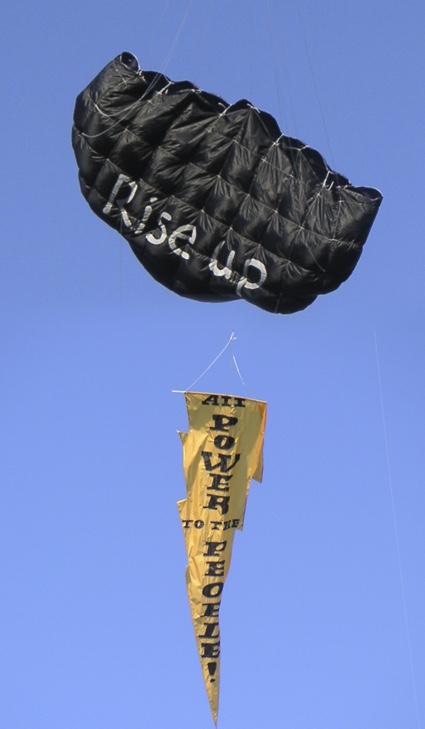 Center for Tactical Magic, Uprising!
Center for Tactical Magic, Uprising!
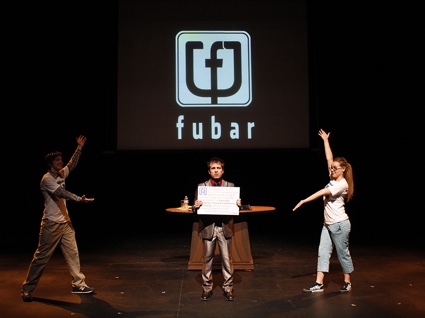 Center for Tactical Magic, FUBAR Magic Show
Center for Tactical Magic, FUBAR Magic Show
How was it pivotal?
What i mean by that is that it seems like a fixed position from which you can rotate in any direction. From a position of acting, it means that you have multiple options and directions that you can move from. It’s a formal strategy, it’s a discursive strategy, it’s also a performative strategy for acting in the world. And some of that is informed by studying within martial arts where i learnt that you don’t ever want to be stuck in a place where your options are very limited. For me it’s not about being ambiguous or evasive just for the sake of being ambiguous or evasive. But you open up options, different ways of addressing an issue, a topic, an event or a situation as it is unfolding.
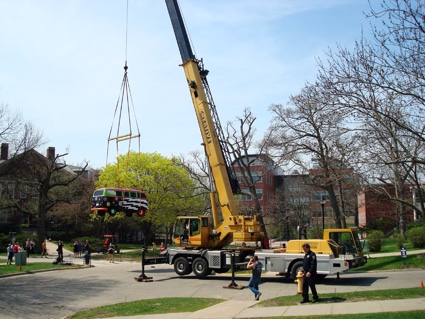 Center for Tactical Magic, Transporter. A Social Witches’ Cradle
Center for Tactical Magic, Transporter. A Social Witches’ Cradle
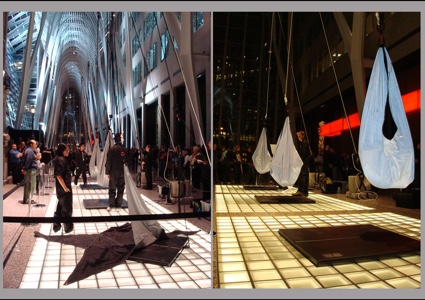 Center for Tactical Magic, Witches’ Cradles. In Search of an Altered State
Center for Tactical Magic, Witches’ Cradles. In Search of an Altered State
I’d like to go back to the darker side of magic. In the interview mentioned above you talk about occultism. Does it apply to your practice?
The word ‘occult’ literally means ‘hidden.’ When we think about what is hidden then all of a sudden what we might consider occult enters into that same conversation. So we look at things like military black budgets, or laws that are not transparent in terms of how they affect people’s life. Or even the degree to which we understand technologies or how technologies operate or function, both in a physical sense -what is exactly happening inside the phone mechanically or electronically- but also in the sense of how does the functioning of a technology impacts us in ways that we don’t see. And this can include things like the fact that it relies on invisible signals, it relies on the electromagnetic spectrum which our eyes cannot detect without other devices. But it also determines our social relations or economic relations because it impacts the way we communicate. Once we are open to those associations, we start to backtrack and look at how the history of occultism is very directly tied to our present condition. What i mean by that is the history of occultism is not simply people behaving in ‘dark ways’. You need to banish this false dichotomy of light and dark, good and evil. There are certainly colonial overtones to that association of dark as evil and making those connections simplifies what it is that we are talking about. Most of the claims historically of occultism in a huge varieties of areas is -to one degree or another- about empowerment and i think in ‘darker’ instances, empowerment means power over others but in the more positive instances, it also means communal power or coming to power together, or avoiding situations where abuse of power by others is taking place.
How can we bring more magic to our life? And should we?
I would go back one moment and say: i think you should take magic seriously but also not too seriously. I would say the same thing about government business. I think you should take government and business seriously but also not too seriously?
Why not too seriously?
I think because you have to approach it critically. You have to approach it rigorously. You have to be engaged.
There is also power in play. There is magic that happens when you approach something with a degree of levity, with this idea that there are rules to any game. And once you understand the game, there are ways to bend those rules or figure out how to interact in ways that might be unexpected. So it’s not that we dismiss corporations or governments or that we disregard their power in the world but at the same time, if we take them too seriously and only too seriously we miss out on opportunities to subvert or circumvent what it is that they are doing in the world.
Maybe the shorter version would be to say that i think government and corporations are invested in shaping reality and shaping reality is an inherently creative process and playing is also a way to engaging creative process to shape alternative realities.
But let’s get back to your earlier question which was about making the world more magical. I understand that when we develop projects that are magic related, people might be dismissive towards either that name ‘magic’ or the idea of magic. It is sometimes a barrier to entry but the hope is also that once people realize that their assumptions were false or misguided or oversimplified, there is an opening up in terms of what the possibilities are. Magic is all about constantly redirecting people’s assumptions or perceptions about the world. So one thing you can do to have a magical outlook is to always question things like use value, status quo, associations for either materials or relationships and realize they are not fixed. Once you understand the ability to morph those relationships or associations, all of a sudden everything starts to become more magical.
The Center for Tactical Magic seems to be quite successful at engaging the audience, at making them part of the experiences. Including people who might otherwise not be particularly responsive to the kind of social, political or economical issues your projects raise. How do you manage that? Are there some rules? Special tricks?
We use a pop aesthetic at times and we try and draw from cultural themes and expressions that people can relate to but there is this uncanny element to all the projects: people will see something that they are familiar with but presented in an unfamiliar way. In that moment, a recalibration takes place, people start to consider their understanding of the familiar part with respect to the unfamiliar part. When it’s done really well, it forces new cognitive categories to form. All of a sudden people have to create a new category and if that new category is potent enough it will also infect all future associations.
To go back to the Ice Cream Unit for example, people understand ice cream truck and they understand propaganda but when they have the two things together, it changes their associations with both and in the future there is a moment where they encounter another ice cream truck or another model of distribution and it will connect back to the experience that they had with the TICU and potentially it informs their future relations to other things that are connected. Maybe that is expecting too much from a project but that’s the hope in the way these projects are constructed.
Center for Tactical Magic, Linking & Unlinking (a.k.a. – Know Your Rights)
Most of the work of the Center is quite political. Have you ever faced any legal retaliation? or problems with the police? for the Linking & Unlinking – Know Your Rights screening, for example? Or for any other work?
It happens on a semi regular basis. There haven’t been huge entanglement. Knock on wood! Most of the time, it’s some sort of confrontation and it usually more or less resolves itself quietly. There was a standoff with the police with the TICU in Vancouver, Canada, that lasted quite a long time. With the Cricket-Activated Defense System, there were some interesting correspondence, communications and interviews that seemed to come from law enforcement. Strangely enough, the police tried to prevent the kite project (that we did at Huntington Beach in California) from happening and when it did happen they flew a helicopter over the event to monitor it.
It happens from time to time but we do consult with lawyers around our projects, we are generally pretty good at making sure that the conversation with law enforcement doesn’t get us into hotter water than need be. I’m trying to be very careful with my language there. There have been some tough times. There’s been some times when we have attracted attention that was problematic.
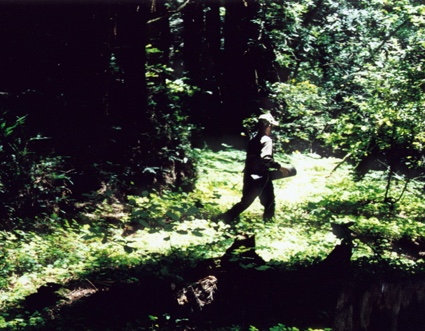 Center for Tactical Magic, Cricket-Activated Defense System, 2000
Center for Tactical Magic, Cricket-Activated Defense System, 2000
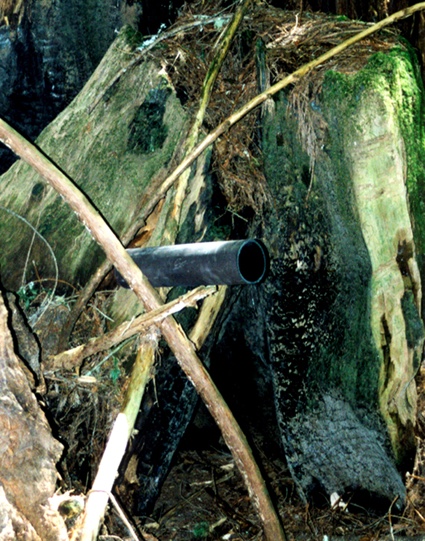 Center for Tactical Magic, Cricket-Activated Defense System, 2000
Center for Tactical Magic, Cricket-Activated Defense System, 2000
So you’re not actively encouraging confrontation or censorship as a part of your artistic strategy? As a way to generate more attention about a given issue?
No. Projects that court confrontation often strengthen polemic and thinking in those binary systems. Even in projects where we are addressing things like police and protester dynamics, we are not trying to diffuse those situations, we are trying to figure out the approach or the position from which you can have the most productive outcome. A confrontation where you are doing something potentially illegal and then you get a police response does not produce a ripple through a greater discourse. What might become a productive moment is when someone is actually practicing their civil or legal rights within a certain context and that person makes visible the power dynamics that might suppress those rights.
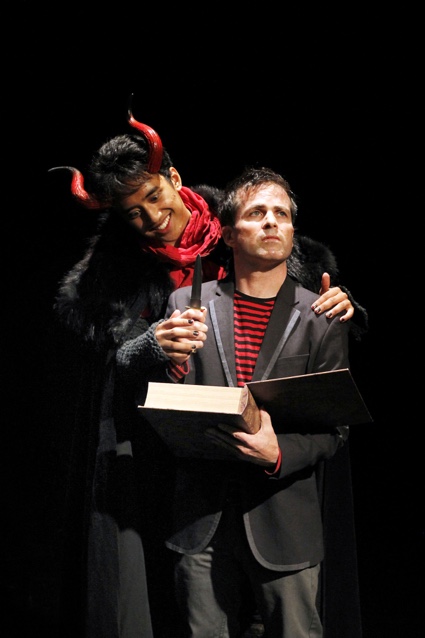 Daniel Ferrer (Lucifer), left, and Aaron Gach (Magician) perform in “The Light and Dark Arts: A Radical Magic Show,” opening May 28 at UC Davis. Huan Yu/Courtesy photo
Daniel Ferrer (Lucifer), left, and Aaron Gach (Magician) perform in “The Light and Dark Arts: A Radical Magic Show,” opening May 28 at UC Davis. Huan Yu/Courtesy photo
I’m curious about The Light & Dark Arts: A Radical Magic Show that ended a few weeks ago at UC Davis’ Main Theater. What was the show like?
It was the first time that i had ever worked into a theatre context. I was writing and directing. Two weeks before the first show, the lead actor broke his hand. He happened to be a student that i was training as a magician. I ended up having to step in as the lead, as the magician. I ended up writing, directing and acting for this first theatre production. So it was unexpected and a bit wild but the audience response was fantastic. People seemed to love it.
Any other upcoming works, research, events you’d like to share with us?
There’s two shows coming up. One is an art show in New Mexico that is specifically oriented around the police state and surveillance. And then there’s an event in Atlanta, Georgia. A public arts festival with tens of thousands of people that come out for a single night event. We have a new project in the works for that event but it’s still very much in development.
Thanks Aaron!
